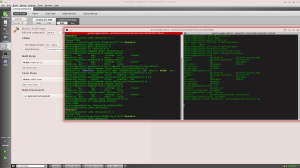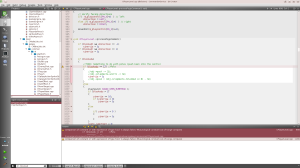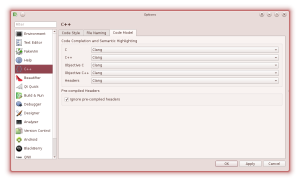Note: This is an old article I had on my old wordpress server.
Since I got some time on my hands I decided to take a look at the hype of LLVM and wondered how does well would it work with Commander Genius…
Now I don’t want to go into details of LLVM or Clang. Tons of information about that technology can be found here and anywhere else asking Dr. Google. I just want to see how well you can build Commander Genius using Clang and what other benefits you get. In this case I used Linux (Mageia 4.1 64-Bit)
CMake
Switching from GCC to Clang is very simple! If you don’t have any obscure defines in your CMakeLists files you use, you can tell cmake to switch to clang by setting:
export CC=/usr/bin/clang
export CXX=/usr/bin/clang++
cmake .
and there you go, just launch make and the build system does the rest. Remember to clean up caches if you had some.
QtCreator 3.2.1
Not as easy, but simple enough. I would launch those two exports in a terminal and then open QtCreator so its underlying build-system takes it correctly.
By using the clangmodel you get livefeedback without even compiling your sources. In some cases you get feedback while typing. You had that before, but now the messages come directly from the compiler, it matches to the whole build process
First of all you should enable some plugins, because by default they are deactivated. Go to Help->Plugins and enable ClangCodeModel. Don’t forget to restart Qt Creator.
Now you should configure the Kit so Qt Creator knows what to use in order to build your app.
Define a new Kit and viola, it will build using Clang. Nothing special so far except that you can do more from now on.
This is were Clang really shines in my opinion. First of it I feels like it builds a bit faster and links much faster than GCC.
Secondly, the warnings and errors are so much better explained.
And last but not least the Clang Analyzer runs in the background and is able to give you some hints and warnings or even errors as you type. This is great because you don’t need to compile the code first in order to see what you did wrong.
The internal code analyzer used for GCC usually works nice, but since the messages do not come from the compiler, you are not sure, if these messages are real compiler issue. The advantage of that really is, that the analyzer actually uses Clang itself instead of guessing what GCC would say.
Binary sizes
I also did some binary size comparisons:
With GCC 4.8 (64-Bit) I get:
[gerstrong@localhost LINUX (dbfusion)]$ ls -l
-rwxrwxr-x 1 gerstrong gerstrong 3573043 Sep 22 17:50 CGeniusExe*
And with Clang 3.3 (64-Bit):
[gerstrong@localhost LINUX (dbfusion)]$ ls -l
-rwxr-xr-x 1 gerstrong gerstrong 3312886 Sep 22 18:00 CGeniusExe*
Well, at least the binary got a bit smaller, not by much though, but it’s another advantage! :-)
Starting CG all everything went well. No problems, no crashes, stable as with GCC builds and also as fast, so there you go.
I don’t know what to use in future, there is GCC 4.9. I read it has become better, so I would say we have a small compiler wars over here between those two at least. Good thing as usual is, you can decide what you want to use.
What I really like is how well it integrates into Qt Creator so far and how fast it links. This is something that really impressed me.
Nevertheless it has its issues and some warnings just don’t go away even when they are fixed, but still it is some good help and lets you deploy your applications in less time. I’m pretty sure this will be improved in later versions.
So would I recommend it? Yes, yes, yes, a million times! But I also think GCC does a fairly good job and I can’t wait to see what the next versions will do.



